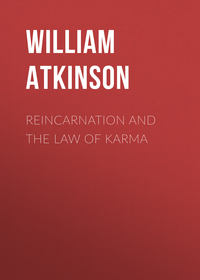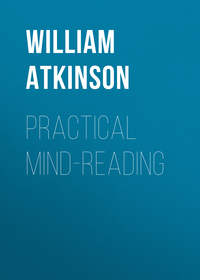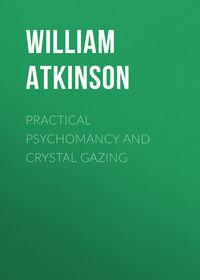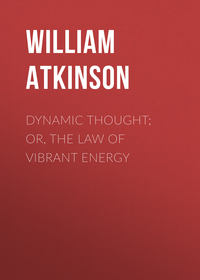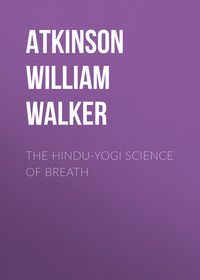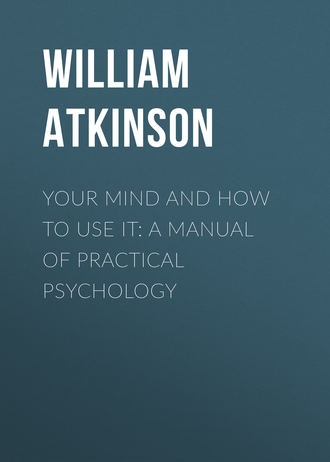
Your Mind and How to Use It: A Manual of Practical Psychology
Deductive reasoning proceeds from general principles to particular facts. It is a descending process, analytical in its nature. It rests upon the fundamental axiomatic basis that "whatever is true of the whole is true of its parts," or "whatever is true of the universal is true of the particulars."
The process of deductive reasoning may be stated briefly as follows: (1) A general principle of a class is stated as a major premise; (2) a particular thing is stated as belonging to that general class, this statement being the minor premise; therefore (3) the general class principle is held to apply to the particular thing, this last statement being the conclusion. (A "premise" is "a proposition assumed to be true.")
The following gives us an illustration of the above process: —
I. (Major premise) – A bird is a warm-blooded, feathered, winged, oviparous vertebrate.
II. (Minor premise) – The sparrow is a bird; therefore
III. (Conclusion) – The sparrow is a warm-blooded, feathered, winged, oviparous vertebrate.
Or, again: —
I. (Major premise) – Rattlesnakes frequently bite when enraged, and their bite is poisonous.
II. (Minor premise) – This snake before me is a rattlesnake; therefore
III. (Conclusion) – This snake before me may bite when enraged, and its bite will be poisonous.
The average person may be inclined to object that he is not conscious of going through this complicated process when he reasons about sparrows or rattlesnakes. But he does, nevertheless. He is not conscious of the steps, because mental habit has accustomed him to the process, and it is performed more or less automatically. But these three steps manifest in all processes of deductive reasoning, even the simplest. The average person is like the character in the French play who was surprised to learn that he had "been talking prose for forty years without knowing it." Jevons says that the majority of persons are equally surprised when they find out that they have been using logical forms, more or less correctly, without having realized it. He says: "A large number even of educated persons have no clear idea of what logic is. Yet, in a certain way, every one must have been a logician since he began to speak."
There are many technical rules and principles of logic which we cannot attempt to consider here. There are, however, a few elementary principles of correct reasoning which should have a place here. What is known as a "syllogism" is the expression in words of the various parts of the complete process of reasoning or argument. Whately defines it as follows: "A syllogism is an argument expressed in strict logical form so that its conclusiveness is manifest from the structure of the expression alone, without any regard to the meaning of the term." In short, if the two premises are accepted as correct, it follows that there can be only one true logical conclusion resulting therefrom. In abstract or theoretical reasoning the word "if" is assumed to precede each of the two premises, the "therefore" before the conclusion resulting from the "if," of course. The following are the general rules governing the syllogism: —
I. Every syllogism must consist of three, and no more than three, propositions, namely (1) the major premise, (2) the minor premise, and (3) the conclusion.
II. The conclusion must naturally follow from the premises, otherwise the syllogism is invalid and constitutes a fallacy or sophism.
III. One premise, at least, must be affirmative.
IV. If one premise is negative, the conclusion must be negative.
V. One premise, at least, must be universal or general.
VI. If one premise is particular, the conclusion also must be particular.
The last two rules (V. and VI.) contain the essential principles of all the rules regarding syllogisms, and any syllogism which breaks them will be found also to break other rules, some of which are not stated here for the reason that they are too technical. These two rules may be tested by constructing syllogisms in violation of their principles. The reason for them is as follows: (Rule V.) Because "from two particular premises no conclusion can be drawn," as, for instance: (1) Some men are mortal; (2) John is a man. We cannot reason from this either that John is or is not mortal. The major premise should read "all men." (Rule VI.) Because "a universal conclusion can be drawn only from two universal premises," an example being needless here, as the conclusion is so obvious.
Cultivation of Reasoning FacultiesThere is no royal road to the cultivation of the reasoning faculties. There is but the old familiar rule: Practice, exercise, use. Nevertheless there are certain studies which tend to develop the faculties in question. The study of arithmetic, especially mental arithmetic, tends to develop correct habits of reasoning from one truth to another – from cause to effect. Better still is the study of geometry; and best of all, of course, is the study of logic and the practice of working out its problems and examples. The study of philosophy and psychology also is useful in this way. Many lawyers and teachers have drilled themselves in geometry solely for the purpose of developing their logical reasoning powers.
Brooks says: "So valuable is geometry as a discipline that many lawyers and others review their geometry every year in order to keep the mind drilled to logical habits of thinking. * * * The study of logic will aid in the development of the power of deductive reasoning. It does this, first, by showing the method by which we reason. To know how we reason, to see the laws which govern the reasoning process, to analyze the syllogism and see its conformity to the laws of thought, is not only an exercise of reasoning but gives that knowledge of the process that will be both a stimulus and a guide to thought. No one can trace the principles and processes of thought without receiving thereby an impetus to thought. In the second place, the study of logic is probably even more valuable because it gives practice in deductive thinking. This, perhaps, is its principal value, since the mind reasons instinctively without knowing how it reasons. One can think without the knowledge of the science of thinking just as one can use language correctly without a knowledge of grammar; yet as the study of grammar improves one's speech, so the study of logic can but improve one's thought."
In the opinion of the writer hereof, one of the best though simple methods of cultivating the faculties of reasoning is to acquaint one's self thoroughly with the more common fallacies or forms of false reasoning – so thoroughly that not only is the false reasoning detected at once but also the reason of its falsity is readily understood. To understand the wrong ways of reasoning is to be on guard against them. By guarding against them we tend to eliminate them from our thought processes. If we eliminate the false we have the true left in its place. Therefore we recommend the weeding of the logical garden of the common fallacies, to the end that the flowers of pure reason may flourish in their stead. Accordingly, we think it well to call your attention in the next chapter to the more common fallacies, and the reason of their falsity.
CHAPTER XXVIII
Fallacious Reasoning
A FALLACY is defined as "an unsound argument or mode of arguing which, while appearing to be decisive of a question, is in reality not so; or a fallacious statement or proposition in which the error is not readily apparent. When a fallacy is used to deceive others, it is called 'sophistry,'" It is important that the student should understand the nature of the fallacy and understand its most common forms. As Jevons says: "In learning how to do right it is always desirable to be informed as to the ways in which we are likely to go wrong. In describing to a man the road which he should follow, we ought to tell him not only the turnings which he is to take but also the turnings which he is to avoid. Similarly, it is a useful part of logic which teaches us the ways and turnings by which people most commonly go astray in reasoning."
In presenting the following brief statement regarding the more common forms of fallacy, we omit so far as possible the technical details which belong to text-books on logic.
FallaciesI. True Collective but False Particular.– An example of this fallacy is found in the argument that because the French race, collectively, are excitable, therefore a particular Frenchman must be excitable. Or that because the Jewish race, collectively, are good business people, therefore the particular Jew must be a good business man. This is as fallacious as arguing that because a man may drown in the ocean he should avoid the bath, basin, or cup of water. There is a vast difference between the whole of a thing and its separate parts. Nitric acid and glycerin, separately, are not explosive, but, combined, they form nitro-glycerin, a most dangerous and powerful explosive. Reversing this form of illustration, we remind you of the old saying: "Salt is a good thing; but one doesn't want to be put in pickle."
II. Irrelevant Conclusion.– This fallacy consists in introducing in the conclusion matter not contained in the premises, or in the confusing of the issue. For instance: (1) All men are sinful; (2) John Smith is a man; therefore (3) John Smith is a horse thief. This may sound absurd, but many arguments are as fallacious as this, and for the same reason. Or another and more subtle form: (1) All thieves are liars; (2) John Smith is a liar; therefore (3) John Smith is a thief. The first example arises from the introduction of new matter, and the last from the confusion of the issue.
III. False Cause.– This fallacy consists in attributing cause to a thing which is merely coincident with, or precedent to, the effect. For instance: (1) The cock crows just before or at the moment of sunrise; therefore (2) the cock-crowing is the cause of the sunrise. Or, again: (1) Bad crops followed the election of a Whig president; therefore (2) the Whig party is the cause of the bad crops. Or, again: (1) Where civilization is the highest, there we find the greatest number of high hats; therefore (2) high hats are the cause of civilization.
IV. Circular Reasoning.– In this form of fallacy the person reasoning or arguing endeavors to explain or prove a thing by itself or its own terms. For instance: (1) The Whig party is honest because it advocates honest principles; (2) the Whig principles are honest because they are advocated by an honest party. A common form of this fallacy in its phase of sophistry is the use of synonyms in such a manner that they seem to express more than the original conception, whereas they are really but other terms for the same thing. An historic example of circular reasoning is the following: (1) The Church of England is the true Church, because it was established by God; (2) it must have been established by God, because it is the true Church. This form of sophistry is most effective when employed in long arguments in which it is difficult to detect it.
V. Begging the Question.– This fallacy arises from the use of a false premise, or at least of a premise the truth of which is not admitted by the opponent. It may be stated, simply, as "the unwarranted assumption of a premise, generally the major premise." Many persons in public life argue in this way. They boldly assert an unwarranted premise, and then proceed to argue logically from it. The result is confusing to the average person, for, the steps of the reasoning being logical, it seems as if the argument is sound, the fact of the unwarranted premise being overlooked. The person using this form of sophistry proceeds on Aaron Burr's theory of truth being "that which is boldly asserted and plausibly maintained."
Bulwer makes one of his characters mention a particularly atrocious form of this fallacy (although an amusing one) in the following words: "Whenever you are about to utter something astonishingly false, always begin with: 'It is an acknowledged fact,' etc. Sir Robert Filmer was a master of this manner of writing. Thus with what a solemn face that great man attempted to cheat. He would say: 'It is a truth undeniable that there cannot be any multitude of men whatsoever, either great or small, etc., but that in the same multitude there is one man among them that in nature hath a right to be King of all the rest – as being the next heir of Adam!'"
Look carefully for the major premise of propositions advanced in argument, spoken or written. Be sure that the person making the proposition is not "begging the question" by the unwarranted assumption of the premise.
General Rule of InferenceHyslop says concerning valid inferences and fallacious ones: "We cannot infer anything we please from any premises we please. We must conform to certain definite rules or principles. Any violation of them will be a fallacy. There are two simple rules which should not be violated: (1) The subject-matter in the conclusion should be of the same general kind as in the premises; (2) the facts constituting the premises must be accepted and must not be fictitious." A close observance of these rules will result in the detection and avoidance of the principal forms of fallacious reasoning and sophistry.
Sophistical ArgumentsThere are a number of tricky practices resorted to by persons in argument, that are fallacious in intent and result, which we do not consider here in detail as they scarcely belong to the particular subject of this book. A brief mention, however, may be permitted in the interest of general information. Here are the principal ones: —
(1) Arguing that a proposition is correct because the opponent cannot prove the contrary. The fallacy is seen when we realize that the statement, "The moon is made of green cheese," is not proved because we cannot prove the contrary. No amount of failure to disprove a proposition really proves it; and no amount of failure to prove a proposition really disproves it. As a general rule, the burden of proof rests upon the person stating the proposition, and his opponent is not called upon to disprove it or else have it considered proved. The old cry of "You cannot prove that it is not so" is based upon a fallacious conception.
(2) Abuse of the opponent, his party, or his cause. This is no real argument or reasoning. It is akin to proving a point by beating the opponent over the head.
(3) Arguing that an opponent does not live up to his principles is no argument against the principles he advocates. A man may advocate the principle of temperance and yet drink to excess. This simply proves that he preaches better than he practices; but the truth of the principle of temperance is not affected in any way thereby. The proof of this is that he may change his practices; and it cannot be held that the change of his personal habits improves or changes the nature of the principle.
(4) Argument of authority is not based on logic. Authority is valuable when really worthy, and merely as corroboration or adding weight; but it is not logical argument. The reasons of the authority alone constitute a real argument. The abuse of this form of argument is shown, in the above reference to "begging the question," in the quotation from Bulwer.
(5) Appeal to prejudice or public opinion is not a valid argument, for public opinion is frequently wrong and prejudice is often unwarranted. And, at the best, they "have nothing to do with the case" from the standpoint of logic. The abuse of testimony and claimed evidence is also worthy of examination, but we cannot go into the subject here.
Fallacies of PrejudiceBut perhaps the most dangerous of all fallacies in the search for truth on the part of the most of us are those which arise from the following: —
(1) The tendency to reason from what we feel and wish to be true, rather than from the actual facts of the case, which causes us unconsciously to assume the mental attitude of "if the facts agree with our likes and pet theories, all is well; if they do not, so much the worse for the facts."
(2) The tendency in all of us to perceive only the facts that agree with our theories and to ignore the others. We find that for which we seek, and overlook that which does not interest us. Our discoveries follow our interest, and our interest follows our desires and beliefs.
The intelligent man or woman realizes these tendencies of human nature and endeavors to avoid them in his or her own reasoning, but is keenly conscious of them in the arguments and reasoning of others. A failure to observe and guard one's self against these tendencies results in bigotry, intolerance, narrowness, and intellectual astigmatism.
CHAPTER XXIX
The Will
THE activities of the will comprise the third great class of mental processes. Psychologists always have differed greatly in their conception of just what constitutes these activities. Even to-day it is difficult to obtain a dictionary definition of the will that agrees with the best opinion on the subject. The dictionaries adhere to the old classification and conception which regarded the will as "that faculty of the mind or soul by which it chooses or decides." But with the growth of the idea that the will acts according to the strongest motive, and that the motive is supplied by the average struck between the desires of the moment, under the supervision of the intellect, the conception of will as the choosing and deciding faculty is passing from favor. In the place of the older conception has come the newer one which holds that the will is primarily concerned with action.
It is difficult to place the will in the category of mental processes. But it is generally agreed that it abides in the very center of the mental being, and is closely associated with what is called the ego, or self. The will seems to have at least three general phases, viz.: (1) The phase of desire, (2) the phase of deliberation or choice, and (3) the phase of expression in action. In order to understand the will, it is necessary to consider each of these three phases of its activities.
(1). DesireThe first phase of will, which is called "desire," is in itself somewhat complex. On its lower side it touches, and, in fact, blends into, feeling and emotion. Its center consists of a state of tension, akin to that of a coiled spring or a cat crouching ready for a spring. On its higher side it touches, penetrates, and blends into the other phases of the will which we have mentioned.
Desire is defined as "a feeling, emotion, or excitement of the mind directed toward the attainment, enjoyment, or possession of some object from which pleasure, profit, or gratification is expected." Halleck gives us the following excellent conception of the moving spirit of desire: "Desire has for its object something which will bring pleasure or get rid of pain, immediate or remote, for the individual or for some one in whom he is interested. Aversion, or a striving away from something, is merely the negative aspect of desire."
In Halleck's statement, above quoted, we have the explanation of the part played by the intellect in the activities of will. The intellect is able to perceive the relations between present action and future results, and is able to point the way toward the suppression of some desires in order that other and better ones may be manifested. It also serves its purposes in regulating the "striking of the average" between conflicting desires. Without the intervention of the intellect, the temporary desire of the moment would invariably be acted upon without regard to future results or consequences to one's self and others. It also serves to point out the course of action calculated to give the most satisfactory expression of the desire.
While it is a fact that the action of will depends almost entirely upon the motive force of desire, it is likewise true that desire may be created, regulated, suppressed, and even killed by the action of the will. The will, by giving or refusing attention to a certain class of desires, may either cause them to grow and wax strong, or else die and fade away. It must be remembered, however, that this use of the will itself springs from another set of desires or feelings.
Desire is aroused by feelings or emotions rising from the subconscious planes of the mind and seeking expression and manifestation. We have considered the nature of the feelings and emotions in previous chapters, which should be read in connection with the present one. It should be remembered that the feeling or emotional side of desire arises from either inherited race memories existing as instincts, or from the memory of the past experiences of the individual. In some cases the feeling first manifests in a vague unrest caused by subconscious promptings and excitement. Then the imagination pictures the object of the feeling, or certain memory images connected with it, and the desire thus manifests on the plane of consciousness.
The entrance of the desire feeling into consciousness is accompanied by that peculiar tension which marks the second phase of desire. This tension, when sufficiently strong, passes into the third phase of desire, or that in which desire blends into will action. Desire in this stage makes a demand upon will for expression and action. From mere feeling, and tension of feeling, it becomes a call to action. But before expression and action are given to it, the second phase of will must manifest at least for a moment; this second phase is that known as deliberation, or the weighing and balancing of desires.
(2). DeliberationThe second phase of will, known as deliberation, is more than the purely intellectual process which the term would indicate. The intellect plays an important part, it is true, but there is also an almost instinctive and automatic weighing and balancing of desires. There is seldom only one desire presenting its claims upon the will at any particular moment. It is true that occasionally there arises an emotional desire of such dominant power and strength that it crowds out every other claimant at the bar of deliberation. But such instances are rare, and as a rule there are a host of rival claimants, each insisting upon its rights in the matter at issue. In the man of weak or undeveloped and untrained intellect, the struggle is usually little more than a brief combat between several desires, in which the strongest at the moment wins. But with the development of intellect new factors arise and new forces are felt. Moreover, the more complex one's emotional nature, and the greater the development of the higher forms of feeling, the more intense is the struggle of deliberation or the fight of the desires.
We see, in Halleck's definition, that desire has not only the object of "bringing pleasure or getting rid of pain" for the individual, but that the additional element of the welfare of "some one in whom he is interested" is added, which element is often the deciding factor. This element, of course, arises from the development and cultivation of one's emotional nature. In the same way we also see that it is not merely the immediate welfare of one's self or those in whom one is interested that speaks before the bar, but also the more remote welfare. This consideration of future welfare depends upon the intellect and cultivated imagination under its control. Moreover, the trained intellect is able to discover possible greater satisfaction in some course of action other than in the one prompted by the clamoring desire of the moment. This explains why the judgment and action of an intelligent man, as a rule, are far different from those of the unintelligent one; and also why a man of culture tends toward different action from that of the uncultured; and likewise, why the man of broad sympathies and high ideals acts in a different way from one of the opposite type. But the principle is ever the same – the feelings manifest in desire, the greatest ultimate satisfaction apparent at the moment is sought, and the strongest set of desires wins the day.
Halleck's comment on this point is interesting. He says: "Desire is not always proportional to the idea of one's own selfish pleasure. Many persons, after forming an idea of the vast amount of earthly distress, desire to relieve it, and the desire goes out in action, as the benevolent societies in every city testify. Here the individual pleasure is none the less, but it is secondary, coming from the pleasure of others. The desire of the near often raises a stronger desire than the remote. A child frequently prefers a thing immediately if it is only one tenth as good as something he might have a year hence. A student often desires more the leisure of to-day than the success of future years. Though admonished to study, he wastes his time and thus loses incomparably greater future pleasure when he is tossed to the rear in the struggle for existence."




